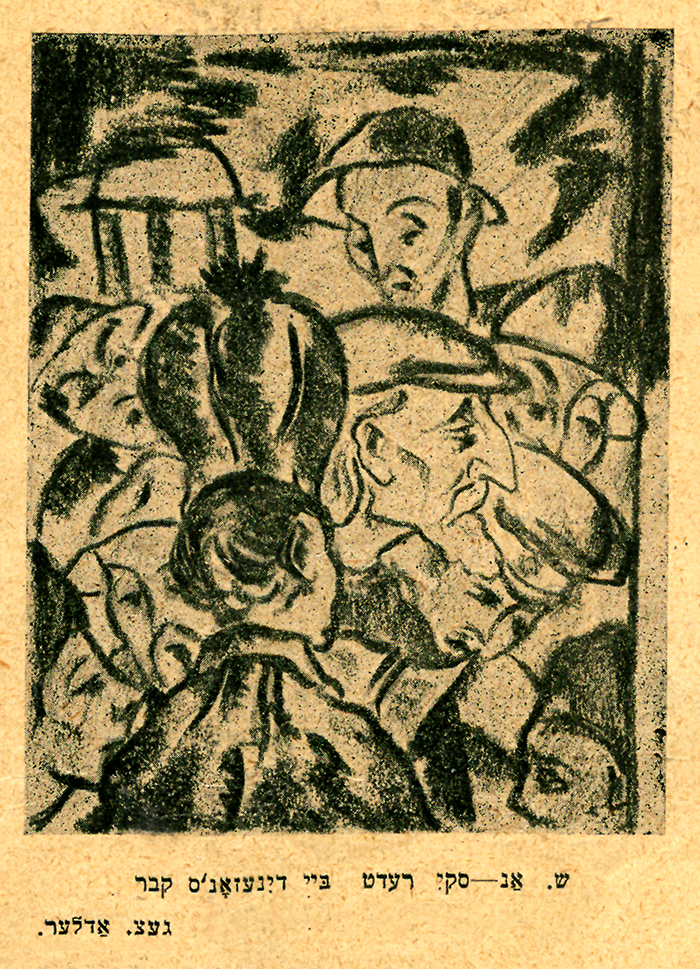Ilustrirte Velt (Illustrated World)
Thursday, September 11, 1919
Warsaw, Poland, No. 10, Pages 145–148
(See Yiddish Version Here)
Translated from the Yiddish by
Mindy Liberman
(Special thanks to Dr. Agnieszka Żółkiewska
of the Jewish Historical Institute, Warsaw,
and the Central Jewish Library, Poland)
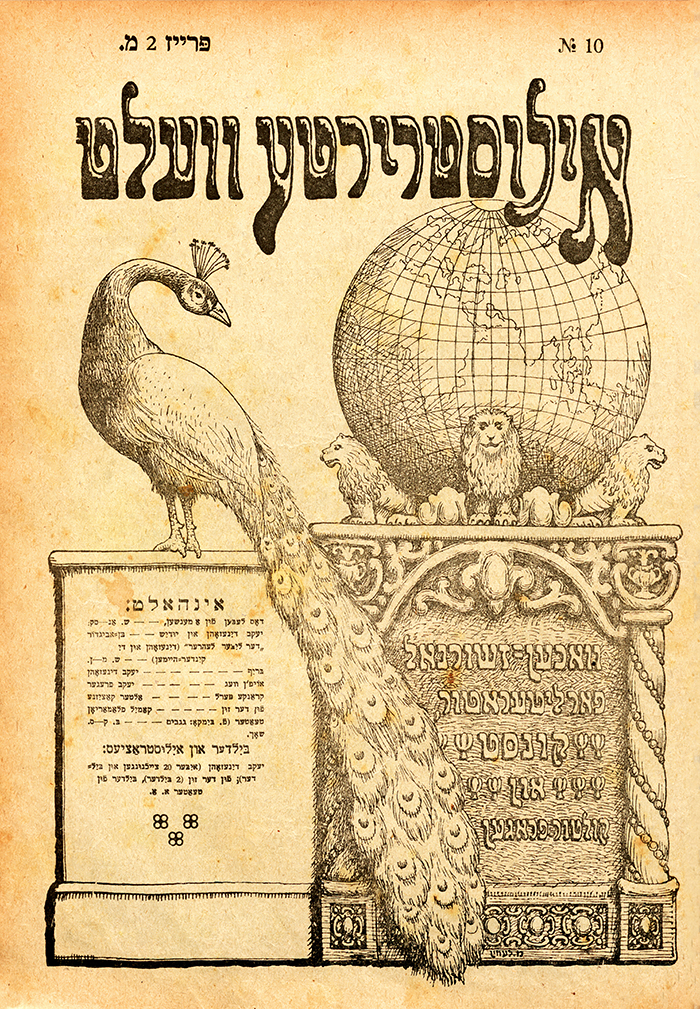
A Person’s Life
By S. An-sky
Dedicated to the dear memory
of my beloved friend Jacob Dinezon
A.
When a person is to be created, God, blessed be He, gives a sign to the angel named Lailah and says to him: “Know that at this moment so and so is being created from this and that drop. And I command you: “Descend to earth, take that drop, and bring it before my divine throne.”
And the angel carries out the command of the Almighty and brings the drop to the threshold of the divine throne.
The Almighty issues his decree about the person to be created: whether male or female, weakling or hero, wealthy or poor, beautiful or ugly.
But whether he will be good or evil, righteous or wanton, that God does not determine.
And The Holy One, blessed be He, gives a sign to the angel who is responsible for the souls and says to him: “Fly to the Garden of Eden and bring from the big barn such and such soul, which looks like this or that.”
Because all souls that have already been created or still need to be created from the six days of Creation until the end of all generations are prepared for the person’s journey.
And the angel responsible for the souls brings the indicated soul from the big barn and places it on the threshold of the divine throne.
The Almighty speaks to her thus:
“Soul! Enter the drop. Penetrate all of its two hundred and forty-eight limbs. Let it be your dwelling place for the duration of the person’s life.”
And the soul bows down and falls onto her face before the Almighty, and opening its lips, utters a plea with great trembling:
“Master of all Worlds, I am very satisfied with the world where I find myself since you created me. If it is your all-powerful desire, do not bring me into an unworthy drop because I am pure and holy.”
And the Almighty answers the soul and says:
“The drop into which I bring you is also a world, holy and infinite. And this world suits you better than the other where you are. And at the time of your creation, you were destined only for this specific drop.”
And the soul weeps and her weeping is heard from one end of the world to the other. And together with her, all the other souls cry, and also the angels and seraphim. But the Almighty pays no heed to their weeping and, with force, brings the soul into the drop.
He summons the angel named Lailah and bids him transfer the drop to the mother’s womb. And at that moment, the drop becomes an embryo, an unborn child in his mother’s womb.
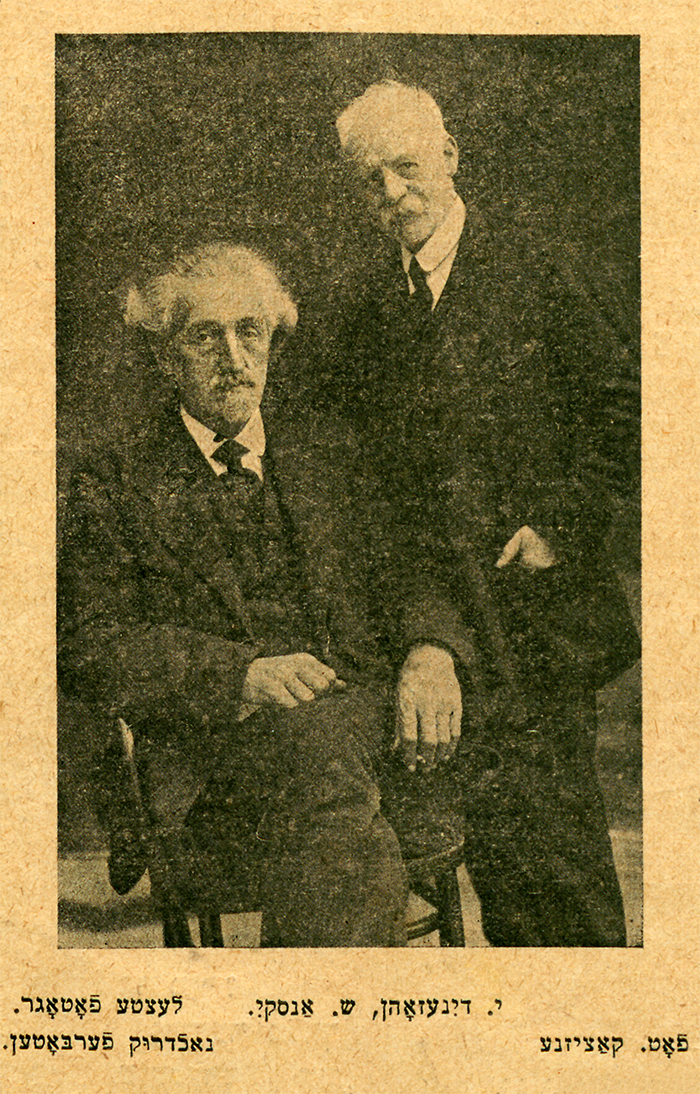
B.
The Almighty grants two guardian angels to the newly created child: a joyful one and a melancholy one. Every morning the joyful angel takes the unborn child and carries him to the Garden of Eden and shows him the Righteous Ones, who sit in great splendor with crowns on their heads and are permeated with the light of the divine presence.
And the joyful angel asks the unborn child: “Do you see these people?”
And the child answers: “I see them.”
And the angel asks further: “Do you know who they are?”
And the child answers: “I don’t know who they are.”
The angel opens his lips and continues: “These whom you see in beauty and glory are like you, created in their mother’s wombs and born in sorrow, and they lived in the world among mortals.
“But they felt the will of the Almighty who created them; therefore, they had the honor of being crowned.”
And in the evening, the melancholy angel takes the unborn child and carries him to hell and shows him the wicked who suffer eternal torments and drown in the depths of disgrace. And their faces are dark, their outlooks without hope, and their voices a choked lament.
And the melancholy angel asks the child: Do you see these people?”
And the child answers: “I see them.”
And the angel asks further: “Do you know who they are?”
And the child answers: “I don’t know who they are.”
The angel opens his lips and says: “These whom you see in disgrace and suffering are like you, created in their mother’s wombs and born in sorrow, and they lived in the world among mortals.
“But they did not feel the will of the Almighty who created them; therefore, they were sentenced to eternal darkness and the gnashing of teeth.
“And now know that you are about to be born and live in the same world, and you have been given the choice of what road to take.”
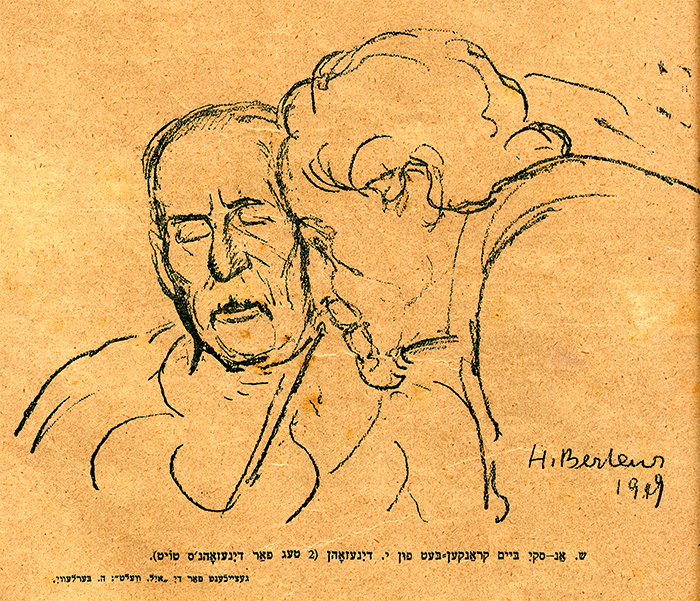
C.
Every day, the two angels, the joyful one and the melancholy one, carry the newly fashioned child and show him the world from one end to the other. And the unborn child absorbs all the voices and sounds, all the colors and signs, and he sees and hears all the joys and sufferings of the world.
And every night, the angels light a candle over the child’s head and teach him the whole Torah, reveal for him all the secrets that have been concealed since the six days of Creation, and lift up before his eyes the edge of the curtain of eternity.
And when the nine months have ended, the angel named Lailah comes to the unborn child and asks him: “Do you recognize me?”
And the child answers: “I recognize you.” And the child asks: “Why have you come to me at this hour?”
And the angel answers him with these words: “The hour of your birth has arrived. You must enter the world of humans.”
And the unborn child says: “I am very satisfied with the world in which I am now, and if it is the will of the Almighty, I beg you, do not lead me into the sinful world of mortals and the ignorant because I am free from sin and all-knowing.”
And the angel answers him and says:
“This world into which I lead you is a world of life and justice. And from the time you were created, The Holy One, blessed be He, has destined you for that world only.”
The unborn child weeps. And his weeping is heard from one end of the world to the other. And together with him, weep all the other unborn in the wombs of the mothers, and also the angels and seraphim.
But the Almighty pays no heed to their cries.
And the angel called Lailah puts out the candlelight over the unborn child’s head and takes him from both angels—the joyful and the melancholy. And then the angel Pura, the angel of forgetfulness, gives him a quick flick just above the upper lip, and in an instant, the child forgets everything he has seen and heard. And the Torah that he has learned, and that which he saw behind the raised-up edge of the curtain of eternity, disappears from his mind. And only in the deep recesses of his heart does the echo of all that he has seen and heard remain.
And with force, the angel Lailah leads him away from his mother’s womb.
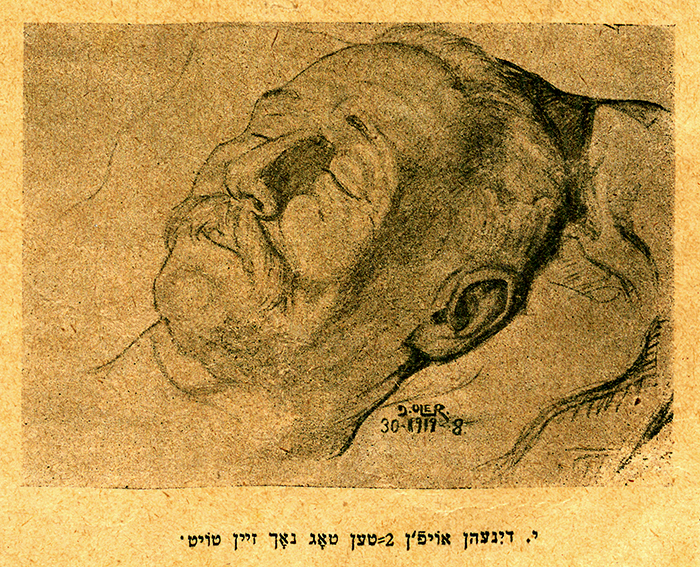
D.
And from that time on, the person travels through seven worlds.
In the first world, he is likened to a new czar whom everyone greets, encounters with joy, and upon whom they bestow gifts.
In the second world, he is likened to a billy goat who feeds in the marshes, jumps about happily without worries, and devours grass that it hasn’t sown.
In the third world, he is likened to a young colt that knows no restraints and is drunk with freedom and passions.
In the fourth world, he is likened to a nimble horse that runs happily harnessed and doesn’t feel the wagon with its lightweight passengers.
In the fifth world, he’s likened to a donkey loaded with cargo that makes its way with difficulty under the driver’s whippings.
In the sixth world, he’s likened to a dog that shamelessly lugs around everything that he can and barks at everyone who approaches.
And in the seventh world, he is likened to a monkey that has the appearance of a human but is nonetheless not the same as a human. He loses his reason, everyone laughs at him, and no one listens to him.
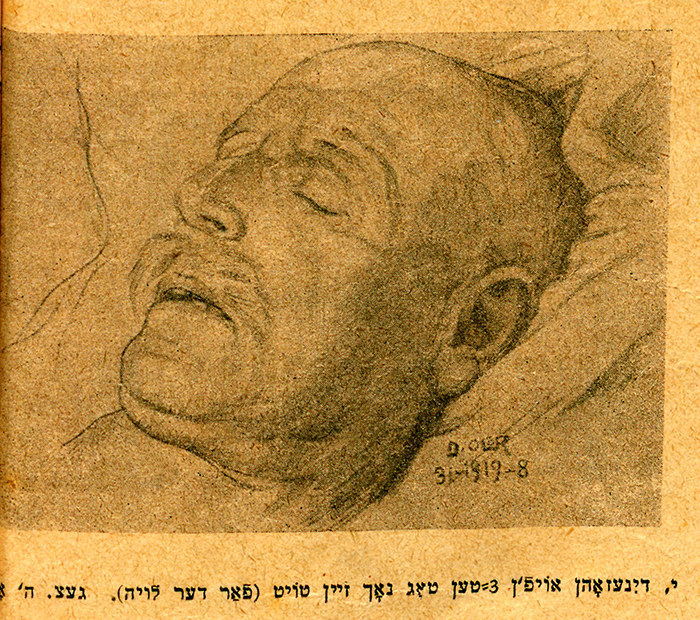
E.
And then comes the hour of a person’s death.
And again, the angel called Lailah comes to him and asks: “Do you recognize me?”
And the person answers: “I recognize you.”
And the person asks: “Why have you come to me at this hour?”
And the angel answers: “I have come to take you from the world. The day of your death has arrived.”
And the person does not wish to leave the world and says: “You have led me away from two worlds which I did not want to leave. Why have you come again to take me away from this world?”
And the person cries bitterly and screams, and his screams carry from one end of the world to the other, but no living person hears him because their hearts would melt. Only the rooster hears the cries and answers.
And the angel called Lailah says to the person: “Know this: you were created against your will, you lived against your will, and against your will, you will die and have to give a spiritual reckoning to the King of Kings, may His name be blessed.
And the angel takes the person’s soul from him.
